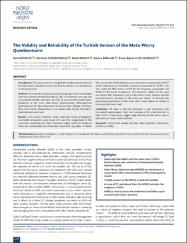The validity and reliability of the Turkish version of the Meta-Worry Questionnaire
Citation
Gündüz A, Gündoğmuş İ, Engin B, Bağlar G, Usta Gündüz EB. The Validity and Reliability of the Turkish Version of the Meta-Worry Questionnaire. Arch Neuropsychiatry 2022; 59(3):218−225.Abstract
Introduction: This study aims to investigate the validity and reliability of the Meta-Worry Questionnaire in the Turkish version as a contribution to clinical practice.
Method: The research sample consisted of two groups. Cases were people who have General Anxiety Disorder (n=165) and controls were age and sex-matched healthy volunteers (n=158). To evaluate the psychometric properties of the scale, Meta-Worry Questionnaire, Metacognition Questionnaire-30, Beck Depression Inventory, Beck Anxiety Inventory, Penn State Worry Questionnaire and Generalized Anxiety Disorder-7 Questionnaire were used.
Results: In this study, Cronbach's alpha coefficient values of frequency and belief components were found 0.92 and 0.94, respectively. At the same time, excluding each item, Cronbach's alpha coefficient values of these two components also remained above 0.90, regardless of which item was chosen. While the frequency component accounted for 69.07% of the total variance, the belief component accounted for 72.95%. The area under the ROC curve is 0.948 for the frequency component and 0.944 for the belief component. The construct validity of the scale was tested with Exploratory and Confirmatory Factor Analysis and the one-dimensional structure of the scale was shown. To evaluate the psychometric properties of the scale, other scales which are related to metacognition were used.
Conclusion: All items in the tool displayed a high correlation with the overall questionnaire. High total variance of the scale indicates its high validity. These results suggest high reliability of the tool as well as consistency of every item it includes.
Source
Nöro Psikiyatri ArşiviVolume
59Issue
3URI
https://pubmed.ncbi.nlm.nih.gov/36160071/https://www.noropsikiyatriarsivi.com/sayilar/2022/59_3/en/npa_59-3_218-225.pdf
https://hdl.handle.net/20.500.12780/670


















